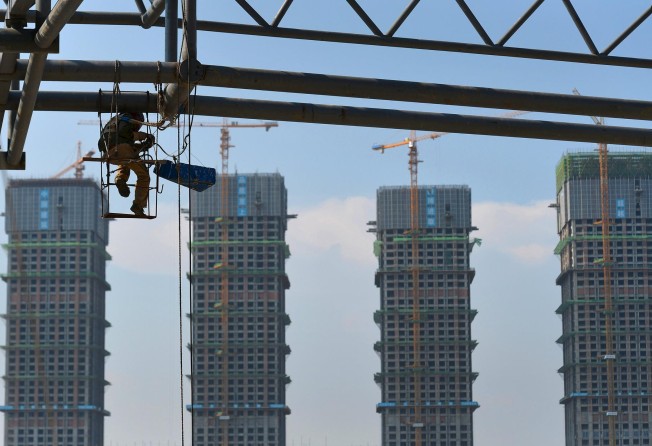Chinese developers waiting for golden September after stock market rout and yuan devaluation
Mainland property firms look for sales to pick up after stocks rout and yuan devaluation

For Chinese developers reeling from the double whammy of a stock market rout and a depreciating yuan, September means hope.
July and August are traditionally the slack season for home sales because of the hot weather. This year, it has coincided with a plummeting stock market, which has wiped out trillions of yuan in stock value and affected home-buying plans.
The spillover effect reduced higher-end housing demand by 110,000 units, according to an estimate by consultancy China Real Estate Information Corp.
As if that is not enough, the central bank unexpectedly devalued the yuan earlier this month. The currency has lost about 3 per cent so far.
This has led to worries about the highly leveraged developers' exposure to foreign currency debts, especially if the yuan's depreciation becomes a trend rather than a one-off move as stated by the authorities.
"We are on the eve of the golden September and the market has started busy preparations," said real estate agency Midland Realty. "Home buyers' enthusiasm will be renewed, and new home sales will jump as supplies will be sufficient."
CRIC said although home prices could still increase, developers should control the pace of inflation to sustain demand, winning themselves time for business restructuring in the longer run.
Economists expect developers and investors to quicken asset diversification to seek safe haven in overseas property markets, a trend that has been picking up pace in the past three years.
They also worry that a weaker yuan will accelerate foreign investors' asset sales in China, while slowing investment into the country's once-sizzling real estate market.
In the tier-1 cities of Shenzhen, Shanghai, Beijing and Guangzhou, the local governments have recently been trying to cool a new frenzy following the housing market's recovery from a year-long correction.
For example, the Tongzhou district of Beijing tightened home purchase restrictions on August 14 after home prices jumped in anticipation of Beijing relocating its municipal government to the district from the city centre.
As a result, second-hand home sales in the district more than halved last week while sales of new homes dropped 22.1 per cent.
Still, prices of new homes were up 13.8 per cent at 25,094 yuan (HK$30,336) per square metre, while those of existing homes remained flat, data from property agency Homelink showed.
Developers mostly reported weaker profit margins for the first half of the year due to destocking in smaller cities still mired in a housing glut. They are gearing up for a better second half to reach already modest sales targets for the year.
Bucking the trend, China Overseas Land & Investment last week announced an increase in its sales target to HK$180 billion from HK$168 billion after an asset injection from its parent company that boosted its full-year saleable stock to HK$280 billion.
However, Sino-Ocean Land Holdings remained prudent. Its chairman, Li Ming, told reporters last week: "Sales this year will be better than last year but will unable to hit the level of 2013."